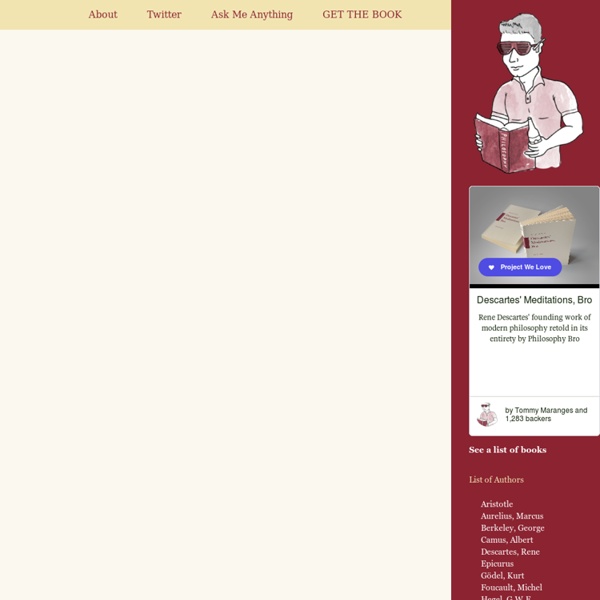



Sequences A sequence is a series of multiple posts on Less Wrong on the same topic, to coherently and fully explore a particular thesis. Reading the sequences is the most systematic way to approach the Less Wrong archives. If you'd like an abridged index of the sequences, try XiXiDu's guide, or Academian's guide targeted at people who already have a science background. Benito's Guide aims to systematically fill the reader in on the most important ideas discussed on LessWrong (not just in the sequences). It also begins with a series of videos, which are a friendly introduction, and useful if you enjoy talks and interviews.
Albert Einstein: Becoming a Freethinker Taken from: Albert Einstein's Autobiographical Notes Open Court Publishing Company, LaSalle and Chicago, Illinois, 1979. pp 3-5. When I was a fairly precocious young man I became thoroughly impressed with the futility of the hopes and strivings that chase most men restlessly through life. 30 Books I’m Glad I Read Before 30 In various ways, these 30 books convey some of the philosophy of how Angel and I live our lives. I honestly credit a fraction of who I am today to each title. Thus, they have indirectly influenced much of what I write about on this site.
In the Pipeline: Cadmium is bad news. Lead and mercury get all the press, but cadmium is just as foul, even if far fewer people encounter it. Never in my career have I had any occasion to use any, and I like it that way. There was an organocadmium reaction in my textbook when I took sophomore organic chemistry, but it was already becoming obsolete, and good riddance, because this one of those metals that's best avoided for life. It has acute toxic effects, chronic toxic effects, and if there are any effects in between those it probably has them, too. Fortunately, cadmium is not well absorbed from the gut, and even more fortunately, no one eats it.
Simple map generation My friends Alex and Rob at Wild Shadow Studios entered the TIG Assemblee competition. In the first 30 days, artists create art assets, and in the second 30 days, programmers create games with those assets. Alex and Rob decided to write an MMO in those 30 days. 18 Cool Inventions From the Past The time between the wars – the Great War and WW2 was one of great loss and uncertainty, but also one of invention, creativity and new ideas. The horrors of WWI shattered enlightenment belief that progress would continue and reason would prevail. New ideas and patterns of life developed in the 1920′s and in the way that people looked at the world [1].
Things I Won't Work With: Dioxygen Difluoride The heater was warmed to approximately 700C. The heater block glowed a dull red color, observable with room lights turned off. The ballast tank was filled to 300 torr with oxygen, and fluorine was added until the total pressure was 901 torr. . . And yes, what happens next is just what you think happens: you run a mixture of oxygen and fluorine through a 700-degree-heating block. 40 Belief-Shaking Remarks From a Ruthless Nonconformist If there’s one thing Friedrich Nietzsche did well, it’s obliterate feel-good beliefs people have about themselves. He has been criticized for being a misanthrope, a subvert, a cynic and a pessimist, but I think these assessments are off the mark. I believe he only wanted human beings to be more honest with themselves.
Dark Ages From Wikipedia, the free encyclopedia Dark Ages may refer to: In history and sociology[edit] Crimes Against Humanity Having been conditioned your entire lives, the way we are all conditioned our entire lives, to receive sound-bite answers to questions we have never had the critical ability to form in our minds, forecloses our ability to interrogate reality and draw conclusions from it. That is the function of the media. That is the function of the educational system you understand.
The Egyptian Book of the Dead Index Sacred Texts Egypt The Papyrus of Ani by Introduction Translation Because of the substantial amount of hieroglypics interspersed in the original text, I have omitted the ### 'glyph' placeholder where context permits, for readability. The Marijuana Trick And I will raise up for them a plant of renown, and they shall be no more consumed with hunger in the land. – Ezekiel 34/29 Where did the word ‘marijuana’ come from? In the mid 1930s, the M-word was created to tarnish the good image and phenomenal history of the hemp plant…as you will read. The facts cited here, with references, are generally verifiable in the Encyclopaedia Britannica which was printed on hemp paper for 150 years:
The Lesser Key of Solomon The Lesser Key of Solomon, also known as Clavicula Salomonis Regis[note 1] or Lemegeton, is an anonymous grimoire (or spell book) on demonology. It was compiled in the mid-17th century, mostly from materials a couple of centuries older.[1][2] It is divided into five books—the Ars Goetia, Ars Theurgia-Goetia, Ars Paulina, Ars Almadel, and Ars Notoria.[1][3] Ars Goetia[edit] The most obvious source for the Ars Goetia is Johann Weyer's Pseudomonarchia Daemonum in his De praestigiis daemonum. Weyer does not cite, and is unaware of, any other books in the Lemegeton, indicating that the Lemegeton was derived from his work, not the other way around.[1][4] The order of the spirits was changed between the two, four additional spirits were added to the later work, and one spirit (Pruflas) was omitted. This portion of the work was later translated by S.
Just a bro who likes philosophy. -- Maybe you've got a big paper coming up, and you haven't done the reading. Maybe there's this guy you've heard about, but you don't have the time to wade through the text yourself. Whatever, bro, I don't judge. Just e-mail your requests to philosophybro@gmail.com. by morgangh Apr 10